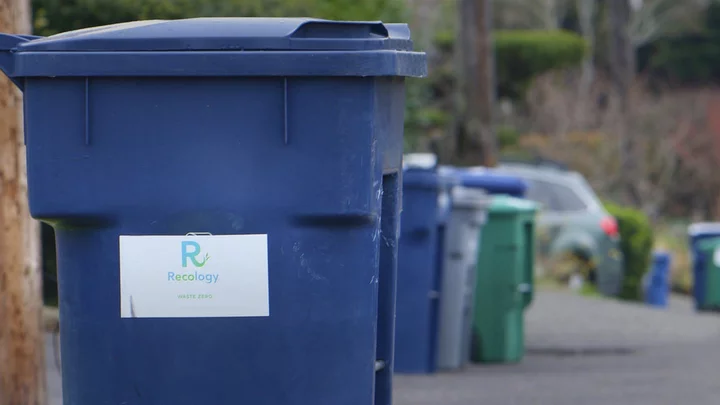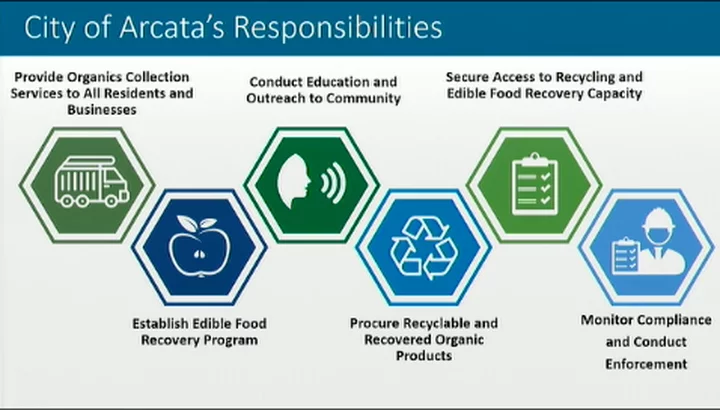Soon you will need to put three bins out on the curb (if you don’t already) | Image from Recology
PREVIOUSLY:
###
If you don’t already compost your food scraps, folks of Arcata, it’s time to start planning for it! During Wednesday night’s meeting, the Arcata City Council introduced an ordinance that will mandate composting all organic waste.
The ordinance is a required step for bringing Arcata into compliance with SB 1383, which requires city and county jurisdictions to compost their green waste, such as food scraps and yard debris, in an effort to reduce the release of greenhouse gasses emitted by organic materials decomposing in our landfills.
For the last two years, the local Solid Waste Local Task Force (LTF) – which includes members of Arcata city staff, along with representatives from other municipalities and the Humboldt Waste Management Authority (HWMA) – have been working on a countywide plan to bring Humboldt into compliance with the bill, which went into effect at the beginning of 2022. In addition to requiring California cities and counties to compost, the law requires jurisdictions to establish food recovery programs (which require food service businesses, like restaurants and grocery stores, to donate edible food) and to use recycled products – such as compost, mulch and renewable gas – for city projects.
With all these different components, rolling out SB 138 is a pretty big undertaking. Luckily, rural communities like Arcata have been granted some extra time to implement the changes. Emily Benvie, deputy director of environmental and community services for the City of Arcata, explained to the council that adopting this ordinance by the end of the year is required to show that the city is on track. The city has another year after adoption to come into compliance with the ordinance, Benvie said.
Once the service is rolled out, it would work like recycling and trash, where businesses and residents put their compost in a bin that is collected by the city. Benvie said that the city would implement a “three-bin system” with one bin for trash, one for recycling and a third, green bin for compost.
This brought up some questions with the council about what this would mean for people who already use a green waste bin for composting yard waste. (Recology does already offer pickup for yard waste, such as lawn clippings and leaves, which are processed at Wes Green Company.) Councilmember Alex Stillman asked if those people would have to use four bins. Benvie said the city would most likely have people use the same bin for yard waste and food scraps, which would then be separated during pre-processing. But Benvie added that the details are still being worked out.
The different components of SB 1383 that Arcata will need to implement | Screenshot from meeting presentation
Another issue that still needs to be worked out is where the food waste will go once it’s picked up. Wes Green processes yard waste, but there is no local facility for composting food scraps. Benvie explained that the city is working with HWMA to develop processing pre-processing infrastructure as quickly as possible. In the longterm, the region is working to develop an in-county organic processing facility. In the meantime, the city is working to develop a franchise agreement
with a processor that would transport the organic waste out of the area organic waste would be transported to an out of area processing facility.
Benvie said that the topics of the franchise agreement, rate increases for collection, and infrastructure for processing will come before the council in spring of 2023.
Several community members expressed concern over the rate increases and the impact it may have on lower income people, and whether or not people should have to pay if they already compost themselves or use another composting business – such as Full Cycle Compost or Local Worm Guy.
There are currently several provisions for waiving the service, including if a property is zero-waste, or if a property does not have space to keep the bin. The ordinance would remove the zero-waste waivers, but the others would still apply. The ordinance also includes a waiver provisions for “self-haulers” – people who already use a service or take their compost to another facility.
Benvie said that after the ordinance returns for adoption and before the changes start to roll out, there will be more opportunities for public questions and input.
“Our intent is to really work with residences and businesses to provide them with ample time and education to understand the implementation of the ordinance as time moves on,” Benvie said during the meeting.
[CORRECTION: This article previously stated that the ordinance would grant waivers to zero-waste properties or to self-haulers and has been corrected to reflect that the ordinance would actually remove the zero-waste waver.]
###
The council was planning to vote on the approval of a contract that would increase the city’s contract with Planwest Partners – the agency that is developing the Gateway Area Plan – by $118,000, to complete more work around establishing zoning and land use policies for the Gateway Plan.
But due to a Fair Political Practices Commission ruling, both Mayor Stacy Atkins-Salazar and Councilmember Alex Stillman must recuse themselves from discussions related to the Gateway Area Plan. Since Councilmember Brett Watson (who recently lost for re-election) was absent, the council would not have a quorum and the discussion was tabled.


CLICK TO MANAGE